The Burrow
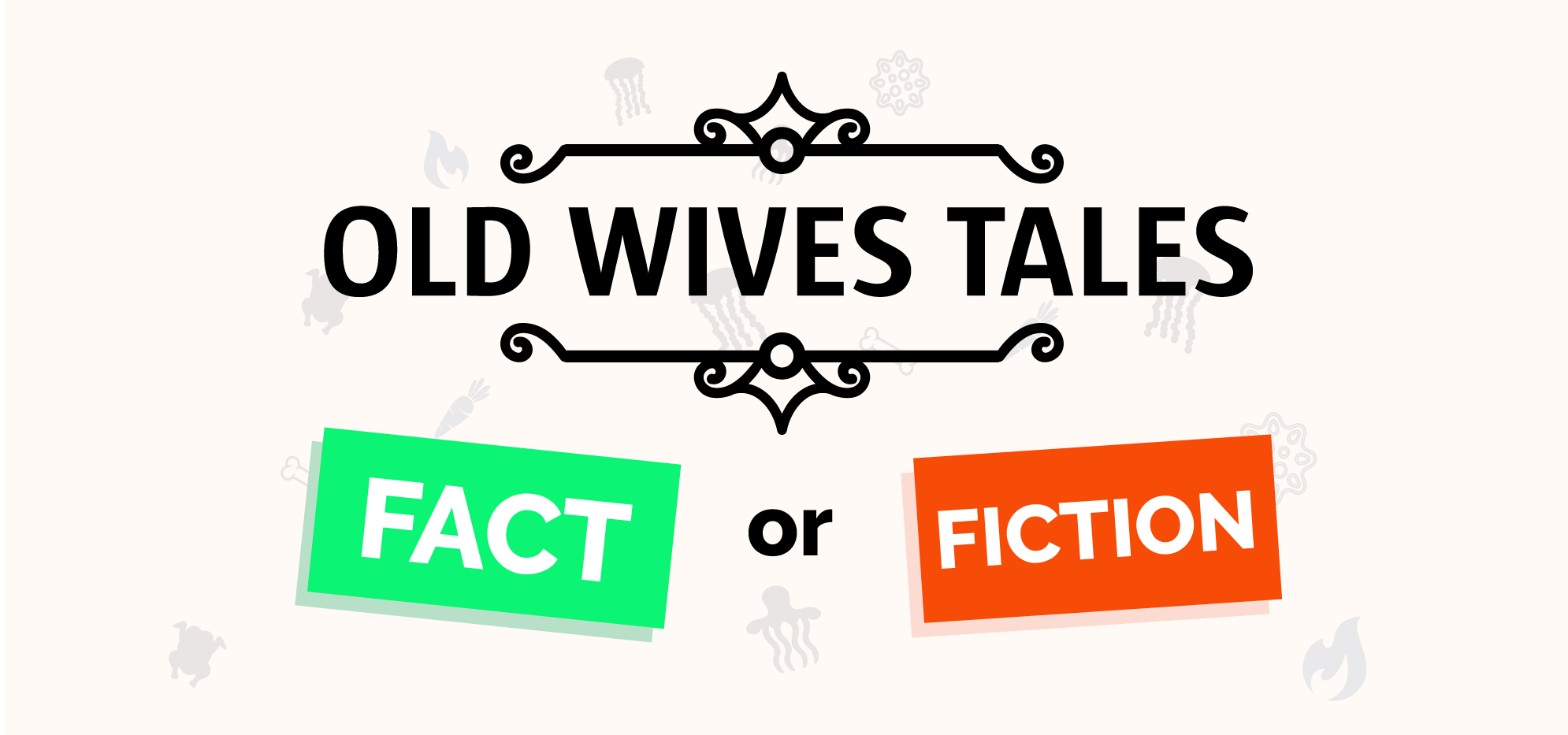
In many cases, maintaining good health relies on receiving good and sound advice. With that in mind, the health insurance experts at Compare the Market wanted to get a snapshot of how health advice looks in Australia.
Perhaps unsurprisingly, a 2022 survey revealed that 1 in 3 Australians have used Google to self-diagnose a medical issue.20 While some online advice can come from reputable and qualified sources, it’s best not to rely on it as online advice cannot be personalised to you based on your own medical history, as can be done with your own GP.
If general health advice is what you’re after, a visit to your GP should suffice which should be covered by Medicare in most cases. However, if you’re after more specialised advice and find there is a gap in payments, that’s where private health insurance may be able to help.
For example, dental, optometrist and chiropractic visits could be covered by an extras cover policy, depending on your level of cover and specific inclusions. Having such a policy is a great way to keep on top of a range of different health concerns and receive specialised advice without the stress of knowing you will footing the full bill.
For other types of advice, it’s easy to be misled. At Compare the Market, we’ve done some research for you on some of the most common old wives tales to help you separate fact from fiction, and set you on a journey to good health. Read on to find out more.
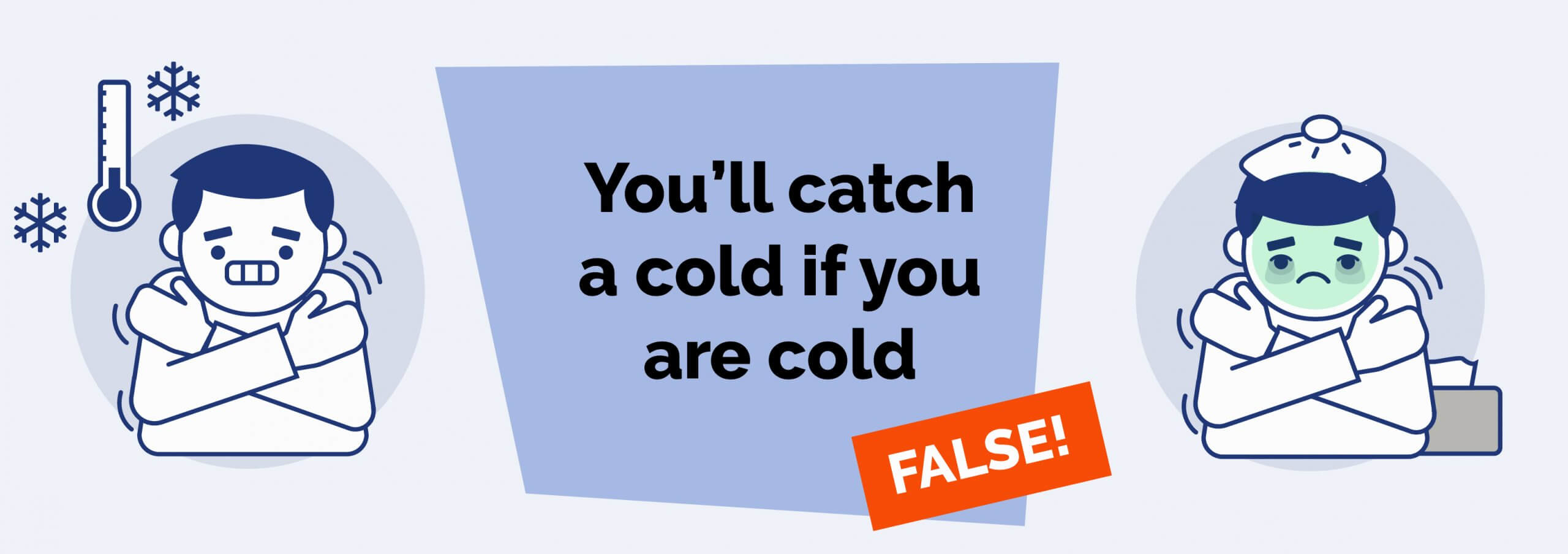
There are a couple of variations of this tale. Some say that going outside or to bed with wet hair will make you get sick, while others suggest that just feeling cold will give you a cold.
If your parents have ever admonished you for washing your hair just before bed or for not wearing a jacket when you were told to, you’ll be pleased to hear that this isn’t the case.
Colds and flu are caused by viruses, not by just feeling generally cold 1. While it’s true that colds and flu are more common during the winter months, it’s thought that this might be because people spend more time indoors and around other people when it’s cold out.
This makes for prime virus-spreading conditions. Colds and flu are spread when the infected person coughs or sneezes, causing droplets of their body fluid (infected by the virus) to filter through the air. These droplets then land on other people who may be within proximity, as is the case when everyone is bundled up inside to escape the cold weather.2
We’re not entirely sure where this tale originally comes from. It just seems to be one of those things that we were told by our parents, who were told by their parents and so on.
Unfortunately, merely layering up or blow-drying your hair isn’t enough to prevent the spread of colds and flu. One of the best ways you can avoid catching something is by practising good hygiene.3
This includes:
Another way you can help prevent the spread of flu is by having the annual flu vaccine.
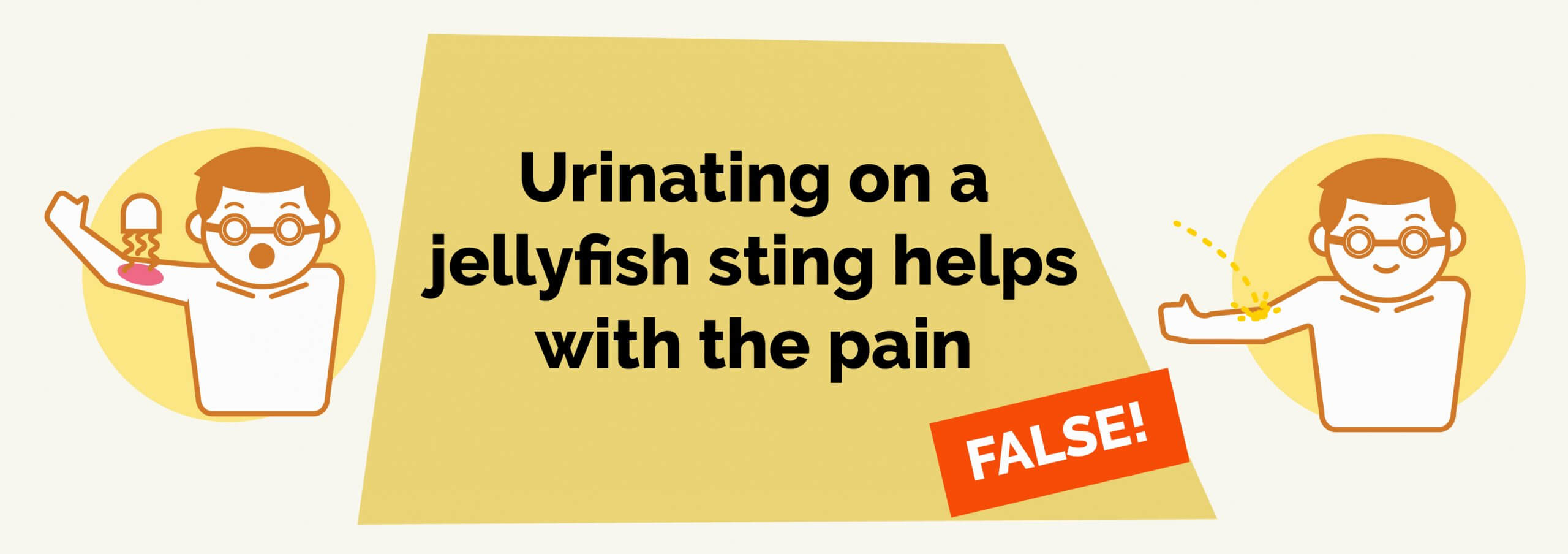
This myth is a little gross, but it’s one we should address.
No doubt you’ve heard the tale (also immortalised by that iconic episode of Friends) that peeing on a jellyfish sting will help alleviate the pain.
If the idea of having to ask your mate or family member to pee all over you if you get stung was enough to discourage you from ever going to the beach, you can breathe a sigh of relief now, because this myth isn’t actually true.
In fact, according to Healthdirect Australia, you should never urinate on a jellyfish sting.4 If you’ve been in the unfortunate position of either the one who released the flow or the one who received the stream, you’re no doubt feeling a little red-faced right now.
The origins of this myth are tricky to place, but the Friends episode probably has something to do with it!
Jellyfish stings are usually pretty painful and, for the most part, don’t need to be treated in hospital.5 However, some types of jellyfish can deliver a dangerous sting that needs emergency help.
For bluebottle (Portuguese man o’ war) and other minor jellyfish stings, Healthdirect Australia recommends:
However, if the stung person is experiencing emergency symptoms (like unconsciousness, severe pain or vomiting), you should call an ambulance.
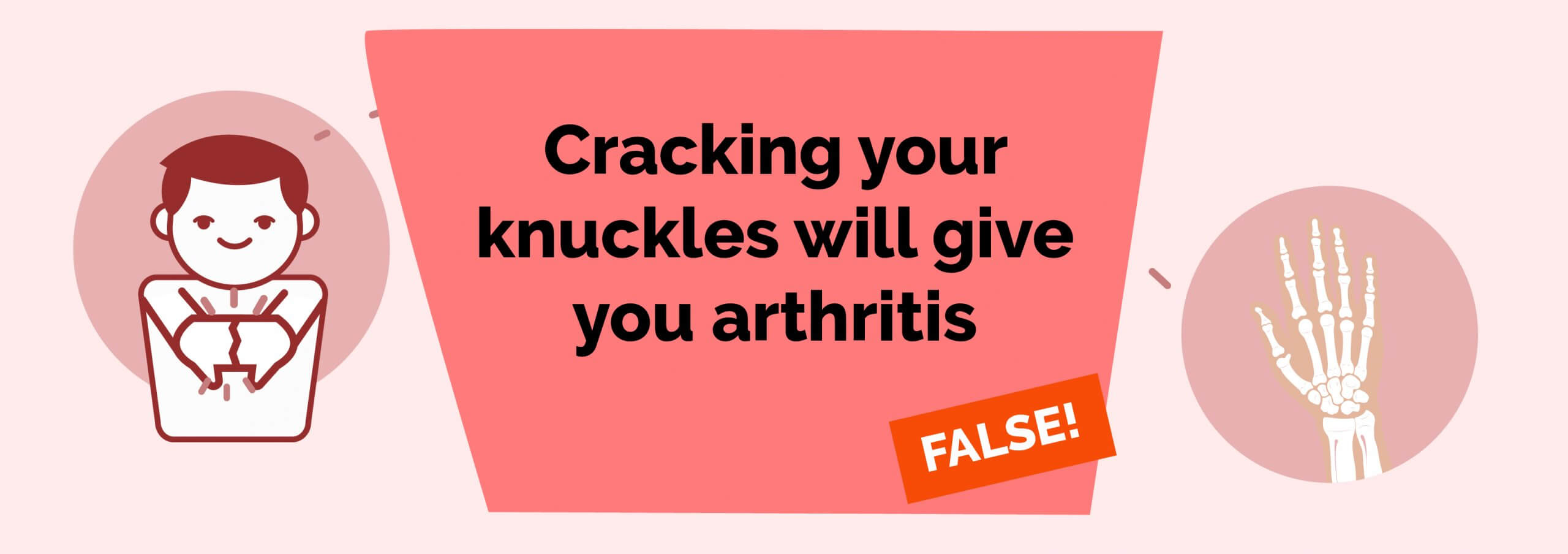
You’ve probably had this tale barked at you by someone (usually a parent, work colleague or friend) after spending several minutes cracking each and every knuckle on your hand. After all, it can be very satisfying!
But now you can crack away with pleasure because cracking your knuckles does not cause arthritis in your fingers!6
Several studies have been done on this myth, including one by a researcher who spent 60 years cracking the knuckles on one hand but not the other to see if arthritis developed in either hand (it did not; both his cracked and uncracked fingers were arthritis-free).
Knuckle cracking is usually caused by air bubbles forming in the synovial fluid between the joints, which then burst. Cracking noises in joints can also be caused by tendons moving over bone and snapping back into place. Most of the time, joint cracking isn’t a cause for concern.
However, some conditions (including osteoarthritis) can also produce noise in your joints, as well as pain. If your joints are painful and crack over long periods, you may need to consult a doctor.
As is the case with a lot of old wives tales, we can’t really be sure where this tale comes from; maybe some poor, exhausted parent just got really sick of hearing their children cracking their knuckles one day and tried to scare them off doing it again.
While the causes of arthritis aren’t entirely clear7 (cracking your knuckles isn’t one, though!), there are things you can do to help minimise the risk of developing it (as well as other chronic diseases).
These include:8
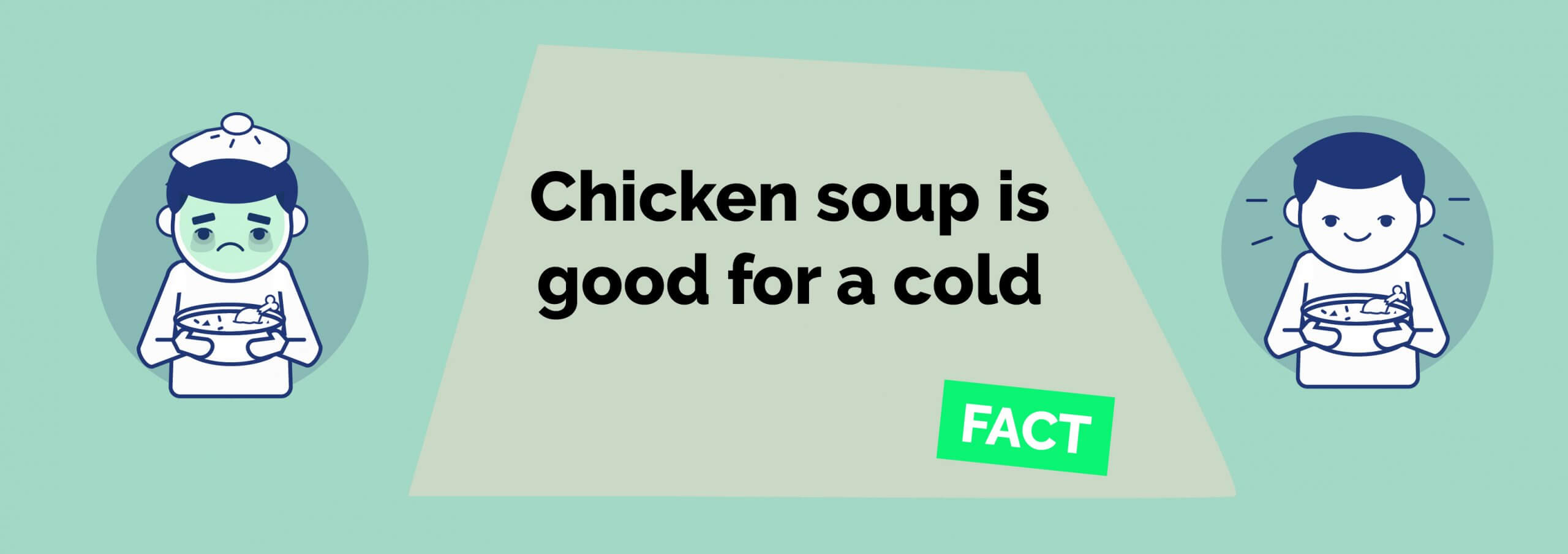
It’s a very common tale that transcends cultures and appears extensively in movies and TV shows: when someone is sick with a cold, they should have chicken soup.
Or should they?
Well, there’s no reason why they shouldn’t. Chicken soup can’t treat or cure your cold, but it can help to relieve your symptoms.9 Soups can be easier to eat when you have a sore throat, and the liquid can be hydrating. Inhaling the warm steam coming off the soup could also help clear nasal mucous.
The use of chicken soup to help alleviate illness can be found in Greek writings.10 Moshe ben Maimon, an Egyptian Jewish philosopher and physician, also spoke about the benefits of chicken soup for colds – back in the 12th century! So it would seem this tale transcends both centuries and cultures around the world.
As well as the classic chicken soup, other things you can do to help alleviate your cold include:11
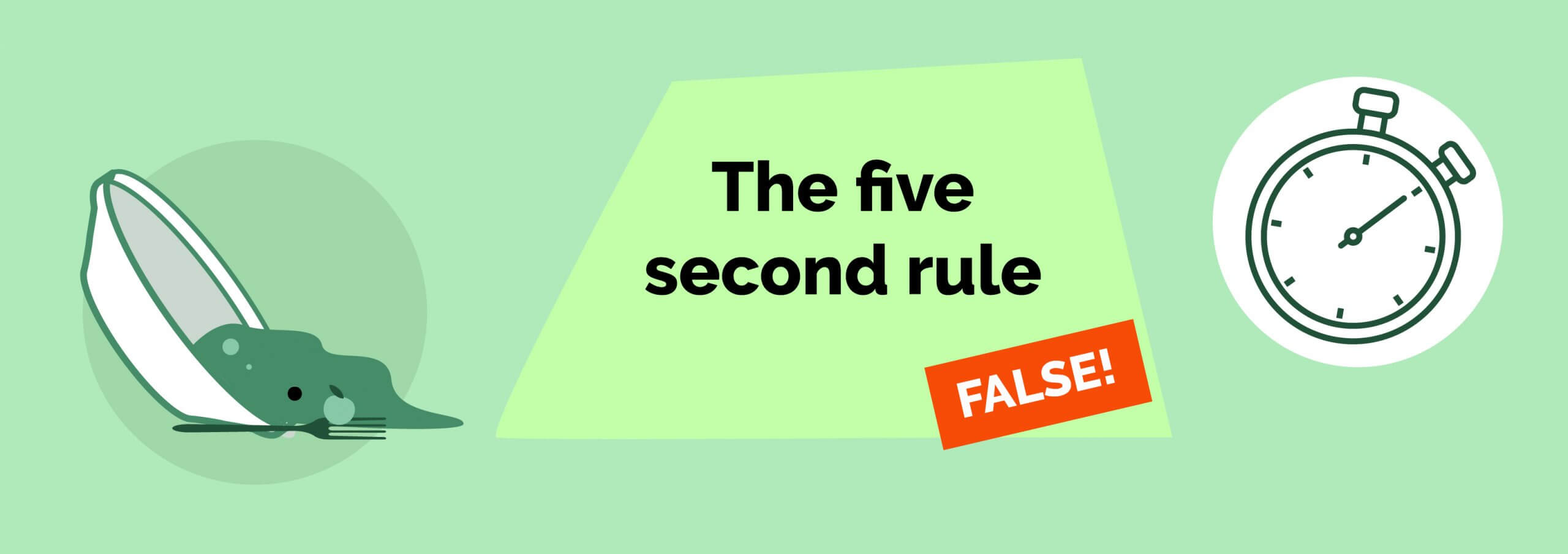
You know how it is: you’re munching down on your favourite snack when suddenly it tumbles to the floor. You’re heartbroken for a second before you realise you have four more seconds to shout ‘five-second rule!’ and pick the food back up. Now you can go back to enjoying your snack believing it’s uninfected by the bacteria crawling around on the ground.
But is that actually true?
Unfortunately, it isn’t.12 The time your food spent on the ground matters very little to bacteria; they’ll crawl onto it as soon as it hits the floor. However, the surface you drop the food on to might affect how much bacteria gets on it. For example, wool carpet doesn’t transfer as much bacteria as tiles and wooden floorboards do – even if it might be more difficult to clean afterwards.
But basically, if the ground you dropped your food on is infected with bacteria, your food will be too no matter how long it stays there.
No doubt you’re now feeling devastated that you can no longer pick your food up off the floor after dropping it, and a little disgusted at all the times you did.
As for where this rule came from, it’s hard to say. Perhaps someone was seen picking up their dropped food and, in a desperate attempt to avoid being judged, said the first thing that came to them – which was probably something like “oh, haven’t you heard of the five-second rule?”
Eating your food off the floor isn’t the only way it can become contaminated. Here are some food safety tips you can use to avoid contamination and potential food poisoning:13
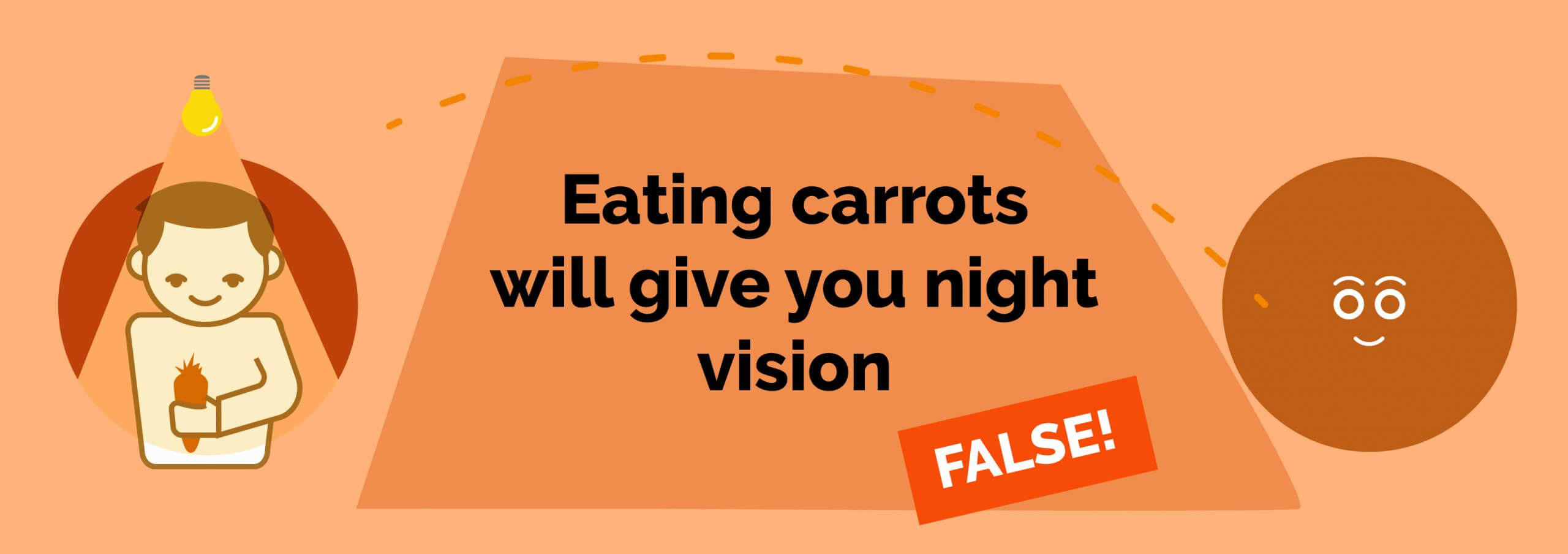
This tale varies slightly from eating carrots gives you night vision to eating carrots improves your overall vision. Still, you’ve probably heard one of these variations at some point in your life; perhaps from your parents in a frustrated attempt to get you to eat your veggies.
It’s an interesting myth because while the main premise (that carrots work wonders for your night vision) isn’t true, carrots do provide some benefit towards your vision.14 Carrots are packed full of beta-carotene, which is converted by your body into Vitamin A, which helps keep your eyes healthy.
So while they won’t give you perfect night vision, carrots are still beneficial for your eyes, and you shouldn’t skimp on them during dinner just because you’re now disappointed you won’t be able to see in the dark.
This tale actually has a pretty cool origin story. During World War II, the British government didn’t want the enemy Germans to learn that the reason British fighter pilots were able to pinpoint the German planes and shoot them down was because of a new type of radar. 15 Instead, they told the British people that the pilots’ night vision was because of carrots.
It certainly was an effective propaganda campaign, as the myth persists today.
While eating carrots can help you maintain healthy eyes – just remember they won’t give you night vision – there are lots of other things you can do to take care of your eyes, including:16
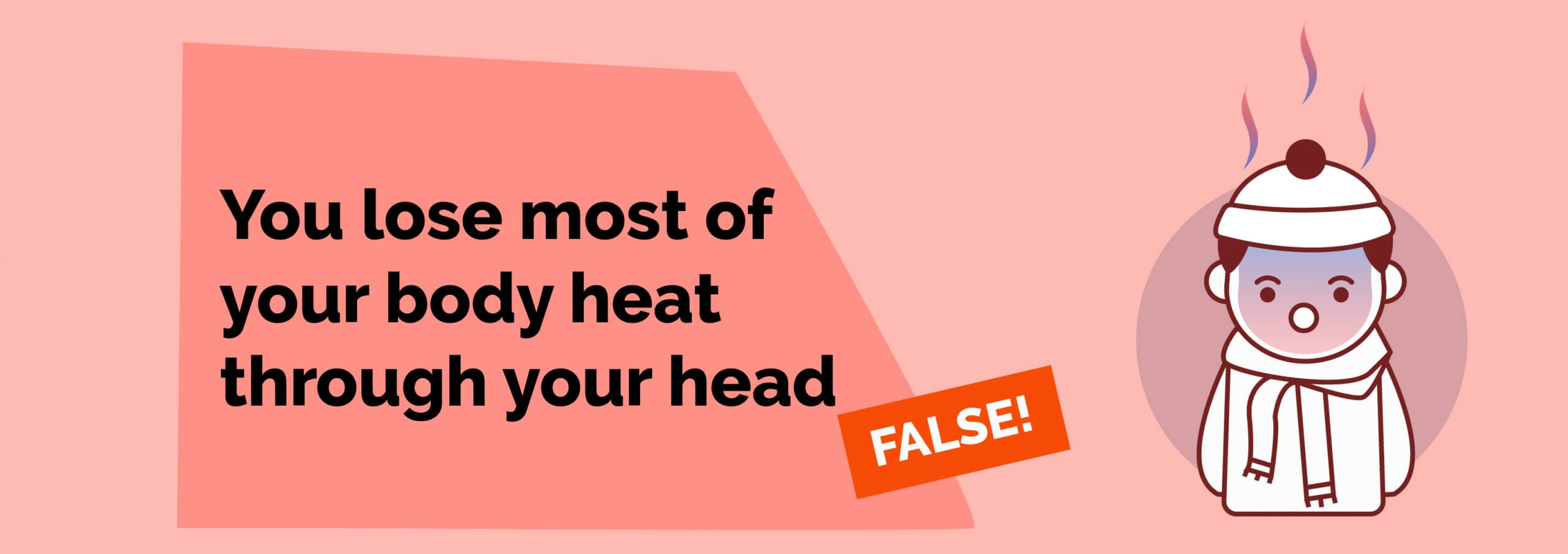
Another dire warning parents give their children who fail to rug up properly is that people lose most of their body heat through their head.
The truth is that you can lose heat through any part of your body that’s exposed to the elements.17 Your head wouldn’t lose any more heat than your abdomen would if they were both exposed to the cold.
People may believe that we lose more heat through our heads because we generally cover the rest of our body in cold weather, so our uncovered head would feel colder in comparison to the clothed areas. However, that doesn’t mean you shouldn’t properly cover up when going out in cold weather.
The origins of this tale could lie in an experiment on Arctic survival carried out the US military back in the 1950s.18 However, the experiment was flawed in that the participants were completely covered – except for their heads. So, naturally, their heads lost the most body heat, and presumably gave rise to this myth.
There are many things you can do to stay warm during cold weather, including:19
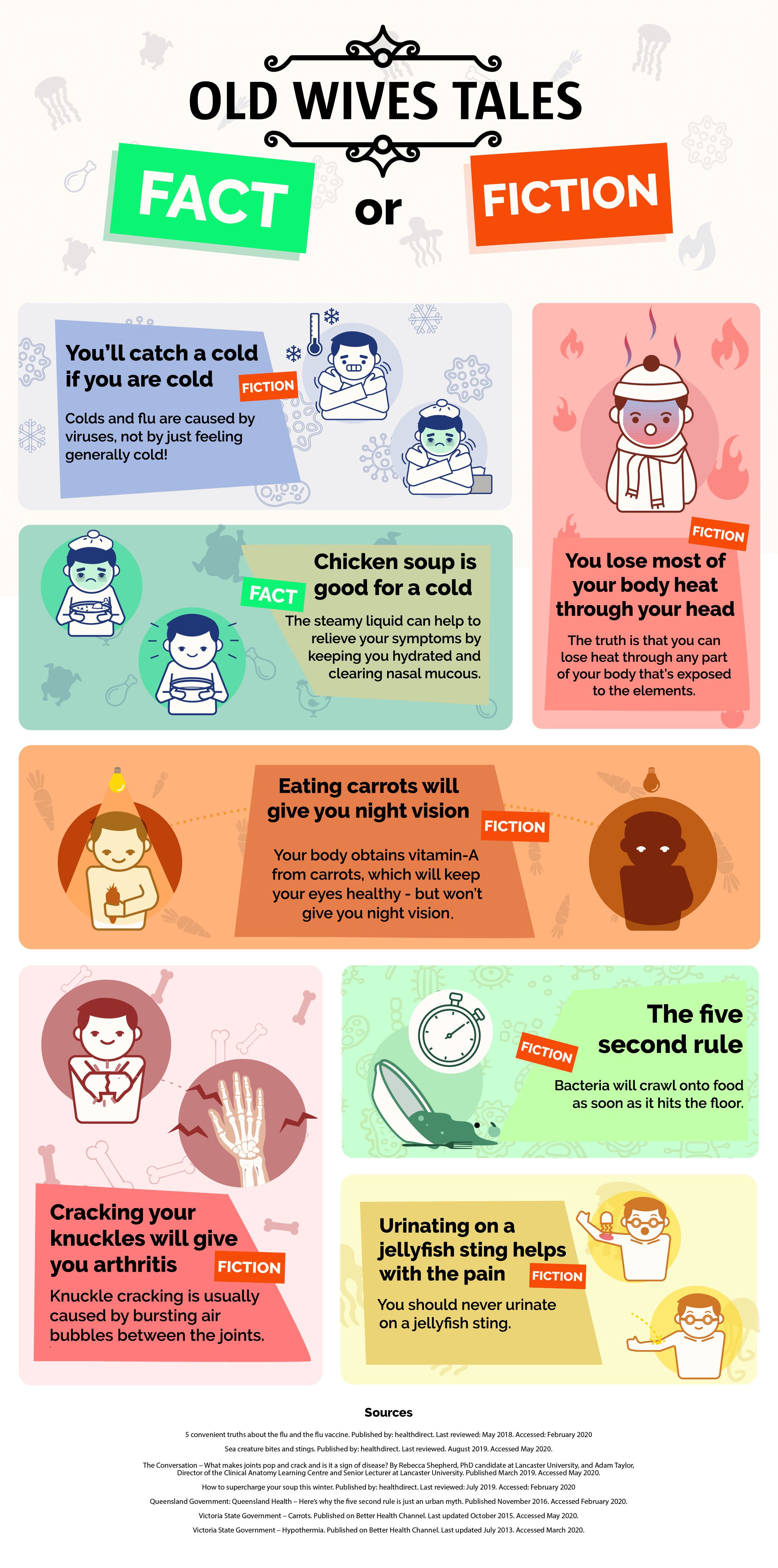
A trip to the hospital can be costly if you don’t have ambulance cover. Depending on where you live, it might be worth having ambulance cover as part of your health insurance policy so that you’re not caught short at the worst of times.
Learn more about health insurance and our Australian comparison service.
[1] Title: 5 convenient truths about the flu and the flu vaccine. Published by: healthdirect. Last reviewed: May 2018. Accessed: February 2020
[2] Title: What causes colds and flus? Published by: healthdirect. Last reviewed: May 2018. Accessed March 2020
[3] Title: Colds and flu prevention. Published by: healthdirect. Last reviewed: March 2019. Accessed March 2019.
[4] Title: Sea creature bites and stings. Published by: healthdirect. Last reviewed. August 2019. Accessed May 2020.
[5] Title: Jellyfish stings. Published by: healthdirect. Last reviewed May 2018. Accessed May 2020.
[6] The Conversation – What makes joints pop and crack and is it a sign of disease? By Rebecca Shepherd, PhD candidate at Lancaster University, and Adam Taylor, Director of the Clinical Anatomy Learning Centre and Senior Lecturer at Lancaster University. Published March 2019. Accessed May 2020.
[7] Title: What causes arthritis? Published by: healthdirect. Last reviewed: June 2018. Accessed: May 2020.
[8] Title: Arthritis prevention. Published by: healthdirect. Last reviewed: June 2018. Accessed: May 2020.
[9] Title: How to supercharge your soup this winter. Published by: healthdirect. Last reviewed: July 2019. Accessed: February 2020
[10] Vicky Cerino (University of Nebraska Medical Center) – Got a cold or flu? UNMC researcher says try chicken soup to ease symptoms. Press release. Published October 2012. Accessed April 2020.
[11] Title: Colds and flu treatments. Published by: healthdirect. Last reviewed: May 2018. Accessed March 2020
[12] Queensland Government: Queensland Health – Here’s why the five second rule is just an urban myth. Published November 2016. Accessed February 2020.
[13] Queensland Government – Preventing food poisoning: handling and hygiene. Last updated February 2020. Accessed March 2020.
[14] Victoria State Government – Carrots. Published on Better Health Channel. Last updated October 2015. Accessed May 2020.
[15]BBC Science Focus – Do carrots really help you see in the dark? By Luis Villazon. Accessed May 2020.
[16] Victoria State Government – 10 tips for good eye health. Last updated October 2015. Accessed May 2020.
[17] Victoria State Government – Hypothermia. Published on Better Health Channel. Last updated July 2013. Accessed March 2020.
[18] IU School of Medicine – Medical Myths for the Holiday Season: True, False or Unproven? Press release. Published December 2008. Accessed April 2020.
[19] Victoria State Government – Cold weather. Published on Better Health Channel. Last updated June 2019. Accessed March 2020.
[20] Mama Mag – 1 in 3 Aussies have self-diagnosed using ‘Dr Google’
Brought to you by Compare the Market: Making it easier for Australians to search for great deals on Health Insurance.